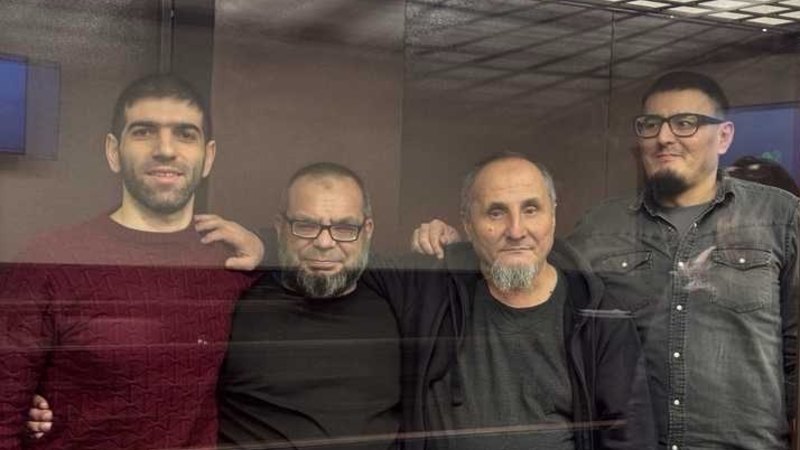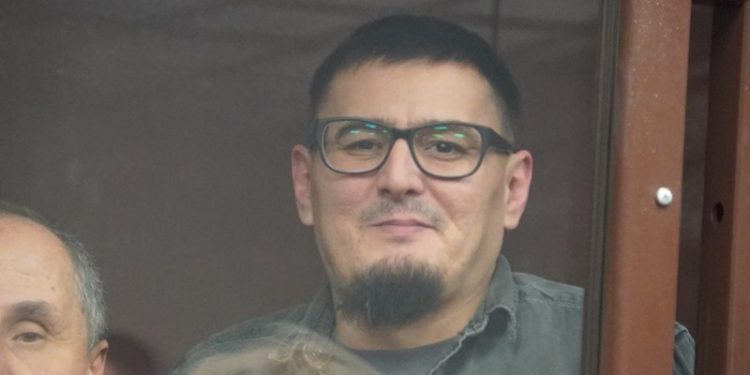Journalist Vilen Temeriyanov and four Crimean Tatar activists, participants in the case of the “first Dzhankoi group” Hizb ut-Tahrir, were sentenced to terms ranging from 13 to 19 years in prison.
The verdict was handed down on November 26 by the Southern District Military Court in Rostov-on-Don, Crimean Solidarity reports.
The court sentenced activist Enver Krosh to 19 years in prison, Edem Bekirov and Rinat Aliyev to 15 years each, journalist Vilen Temeriyanov to 14 years, and Seyitiazi Abbozov to 13 years. The court also determined that Enver Krosh will serve the first four years in prison and the remaining term in a strict-regime colony. The court sentenced the other participants to three years in jail.
Thus, Vilen Temeriyanov was sentenced to a longer term than the prosecutor requested (13 years).
The case of the “first Dzhankoi group” of Hizb ut-Tahrir, consisting of Enver Krosh, citizen journalist Vilen Temeriyanov, Rinat Aliyev, Murat Mustafayev, Seyitiazi Abbozov, and Edem Bekirov, began in August 2022. The Crimean Tatars were arrested in Dzhankoi. They were accused of involvement in the activities of the Islamic political party Hizb ut-Tahrir, which is banned in russia.
The main evidence in this criminal case is an audio recording of a 2015 conversation. On it, people discussed issues of prayer and fasting. Lawyer Emil Kurbedinov is sure that the recording was extracted from the FSB archives eight years later.
“A number of issues about prayer were discussed: how to perform prayer, what the Sharia norms on this issue are, etc. Of course, there were no conversations about terrorism and extremism. This once again proves the nature of the criminal cases [against our clients]. <…> All these years, these people were not criminally prosecuted and did not pose any danger to society,” the lawyer said.
He emphasized that the security forces “had no legal grounds for the arrest” of the Crimean Tatars and that the men had nothing to do with terrorism. Thus, Hizb ut-Tahrir was recognized as a terrorist organization in russia by a 2003 decision. However, the current law On Countering Terrorism, which defines terrorism and clarifies what constitutes a terrorist organization and how it is recognized as a terrorist, was adopted three years later, in 2006.
“Neither the actions of our clients nor their lifestyle falls under this law. This was the main argument [of the defense],” Kurbedinov said.
The defense also insisted in the debate that during the investigation and trial, “a huge number of violations were revealed”: falsification of evidence, provision of evidence that was not relevant to the case, and violations during the interrogation of secret witnesses. Emil Kurbedinov also emphasized that during the searches, the defendants in the case were found to possess banned literature that did not belong to them or their families.
In addition, during the investigation, neither the lawyers nor their clients were given the opportunity to familiarize themselves with the materials the court sent for examination.
And although independent experts confirmed that the books, which are material evidence in the case, have “about ten fingerprints of people, but not a single fingerprint” of the participants, Judge Timur Mashukov denied the defense’s request to send the material evidence to the Military Investigative Committee for examination. He also did not attach the study to the case materials. The defendants themselves stated that they considered the evidence to have been falsified by the investigation.
In many countries, including Ukraine, the activities of the Hizb ut-Tahrir party are not banned. In Crimea, after the annexation of the peninsula in 2014, criminal cases are being initiated on “Hizb ut-Tahrir cases.”
Human rights activists claim that the criminal prosecution of Crimean Tatars is not related to terrorism, but to their peaceful political and religious activism, criticism of the authorities, and protests against repression.


 THE NATIONAL UNION OF
JOURNALISTS OF UKRAINE
THE NATIONAL UNION OF
JOURNALISTS OF UKRAINE
















Discussion about this post